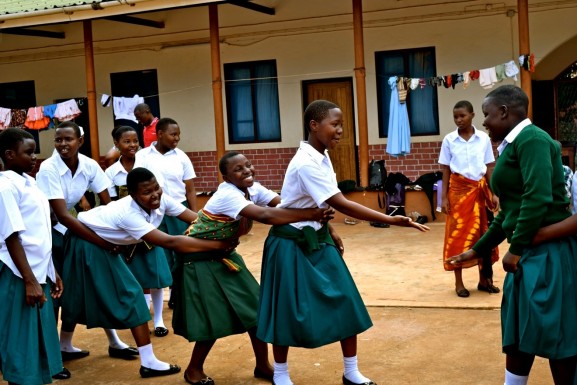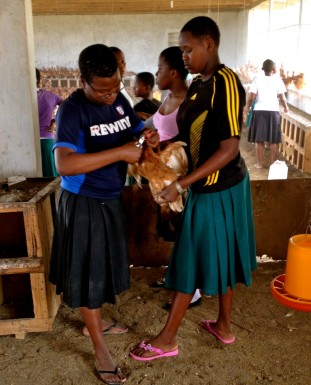When I came to Northeastern as a freshman in August 2009, I was excited about living in Boston, making new friends, and figuring out what I wanted to do with my life. I had no idea what I wanted to do when I graduated, and thought of myself working in the hospitality or social service industry. I never would have guessed that I would instead, end up in Tanzania working for a secondary school for vulnerable girls.
It took me about two and a half years into college to discover my passion. It was only by chance that I decided to take Professor Denise Horn’s Globalization 1101 class where I heard Professor Shaughnessy’s guest lecture on social entrepreneurship. It was then that I knew what I wanted to study. I switched my major from Psychology to International Affairs and declared a minor in Global Social Entrepreneurship.
Like many students majoring in International Affairs at Northeastern, I had an unwavering desire to travel. My first co-op was at EF College Break, encouraging college students to travel. With this experience, I wanted to see the world and learn about different cultures, first hand, and was able to pursue several opportunities at Northeastern. I traveled to Thailand, Israel, studied abroad in Spain, and participated in the Dialogue of Civilizations summer programs in South Africa and Argentina.
With a growing interest in international development, I chose to do my second and third co-ops at non-profits and NGOs, taking positions at Partners in Health and Oxfam America. I loved learning about both organizations, felt motivated by their missions, and knew that my work was indirectly helping people who were suffering. But the more involved I became in this work, the more I realized that I wanted to be on the ground working on the programmatic side of a social venture toward poverty alleviation.
Upon graduation, I met Polly Dolan, an inspiring woman who founded the SEGA Girls Secondary School in Morogoro, Tanzania. SEGA (Secondary Education for Girls’ Advancement) is a school that provides education to vulnerable girls in poverty-stricken villages. They define vulnerable girls as those who are from extremely poor families, orphaned, at-risk or have already dropped out of school or from unsafe home environments. As a registered Tanzanian secondary school, SEGA adheres to the national curriculum; all of which is taught in English. In addition to academics, SEGA emphasizes leadership, entrepreneurship, social responsibility and environmental care to give students practical skills.
So when the opportunity presented itself to work for SEGA and live in Tanzania, I grabbed it.

One of the classes at SEGA spent a day at the Bigwa orphanage in Morogoro, playing with the children, cleaning the environment and participating in other community building activities.
I was hired to manage communications and public relations with SEGA’s U.S-based non-profit, Nurturing Minds, and intended to stay only for five months, then would return to the U.S. to get a “real job.” My work entailed coordinating SEGA’s sponsorship program, and updating supporters on special events and daily activities at the school.
However, I soon realized how much impact I could have with the opportunity to implement some of my own ideas and decided to extend my stay for one to two years.
From my background in social enterprise and business consultation experience in South Africa, my work has been focused on SEGA’s entrepreneurship curriculum where students apply what they learn to real businesses – such as selling chicken eggs. The chicken egg business is in fact helping to ensure the school’s financial sustainability. Students are currently caring for 3,500 chickens and helping the school’s poultry attendant collect eggs, which are then sold around town. Some of the biggest customers are large grocery stores in Morogoro, which is a major accomplishment.

Students at SEGA de-beak the chickens after classes to prevent the chickens from hurting each other, which would impede production.
I also work with the Business Club, attending weekly meetings and advising students. During a field trip on Aug. 8, a national holiday that celebrates farmers and their impact, I took students to Morogoro to sell their different products – eggs, vegetables from SEGA’s organic garden and handmade soaps. The girls learned how to go out and search for their customers and how to effectively market their products.
Part of my responsibility as a volunteer is to be a positive role model for the students and to show them how much they are loved and how much they matter in their communities. This has proven to be critical work for SEGA’s life skills program, a “learning by doing” approach which aims to empower students to give back to their community, build confidence and self-esteem. Many students at SEGA come from volatile and dangerous home environments, so it is vital that SEGA provides a strong support system to encourage and teach them how to protect and care for themselves.
Now that I have extended my time at SEGA, I will begin to manage grants, build partnerships with organizations within Tanzania, work on monitoring and evaluation (M&E) assessments and provide other academic support, including scheduling and serving as a liaison for the volunteers and the administration. It’s exciting to have been given the opportunity to work on aspects of social entrepreneurship and international development that I have only studied.
Learning from Professor Shaughnessy’s classes, I understand the value of measuring impact, which is why I’m thrilled to lead improvements to our M&E tools, and collect data on how SEGA has improved the lives of its students. It will certainly be a challenge, but it is one that I cannot wait to take on.
Feature Photo: a student enjoying her afternoon with one of SEGA’s partners, Right to Play, an organization that uses “play to educate and empower children and youth to overcome the effects of poverty, conflict and disease in disadvantaged communities,” as a part of SEGA’s life skills program.
To learn more about SEGA or Nurturing Minds, visit http://nurturingmindsinafrica.org/


